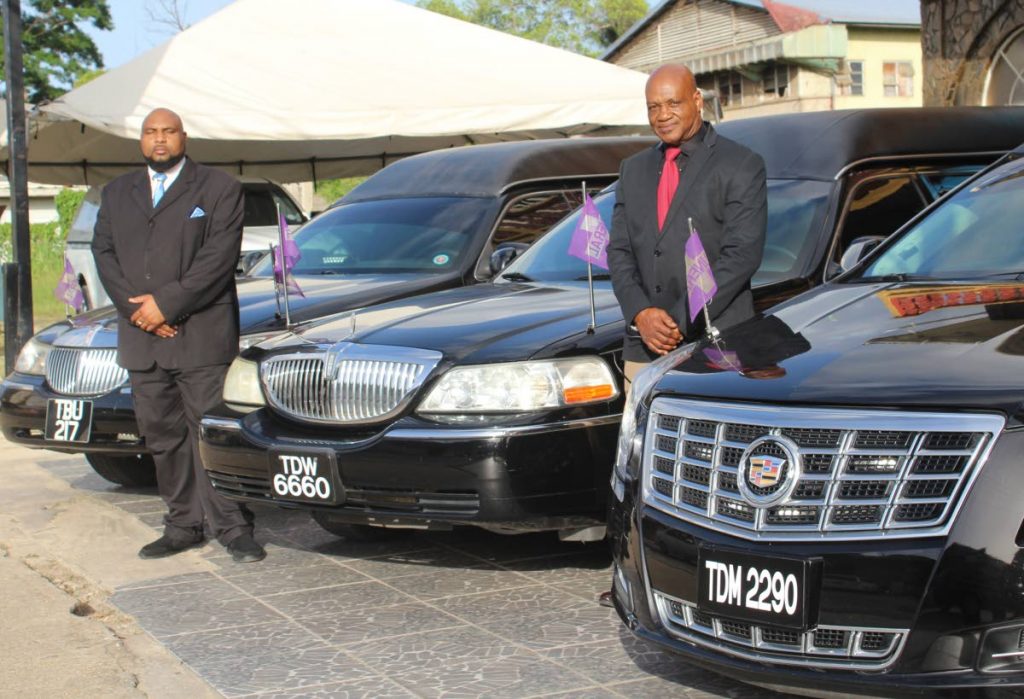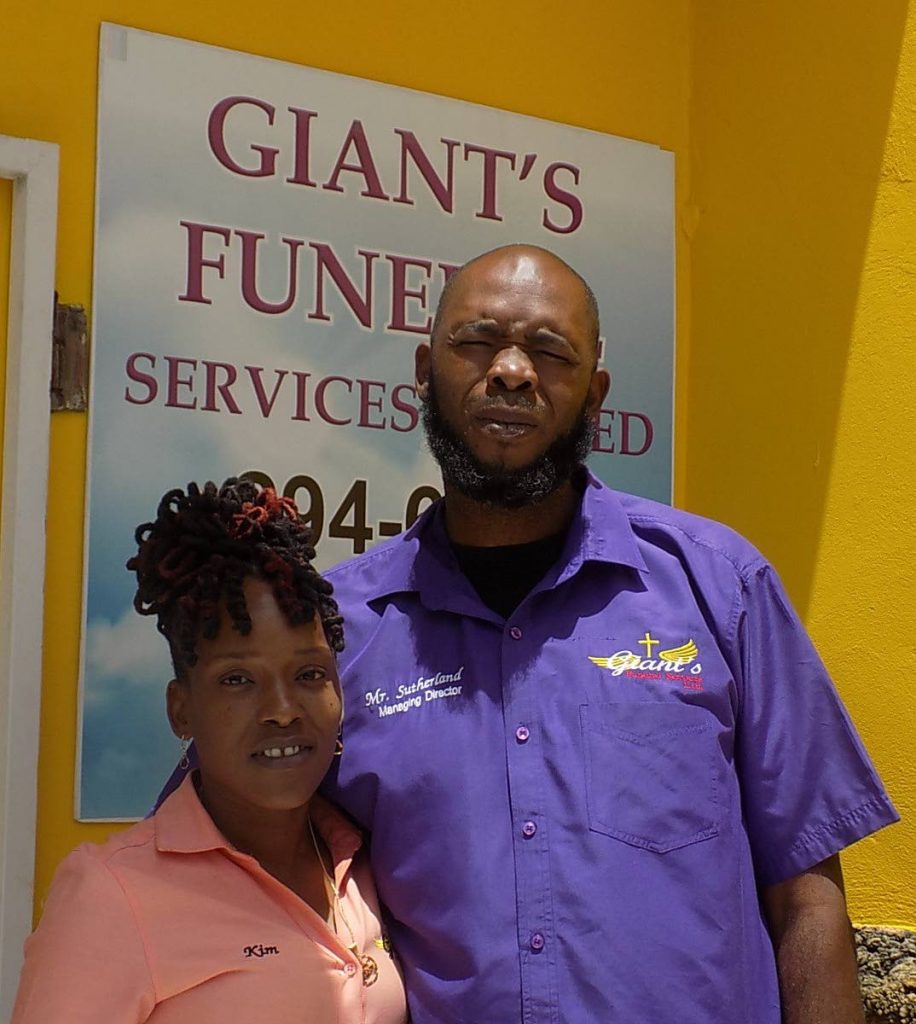The business of the dead

The outbreak of the coronavirus in TT has prompted the temporary closure of businesses considered non-essential to avoid the spread of the virus.
If essential workers like the police, fire and medical services are the first responders during a time of crisis, funeral homes are the last responders, but their job is just as demanding.
Sunday Newsday recently spoke to the operators of two funeral homes to get a better understanding of the work they do, while giving them a chance to dispel misconceptions about their business and the challenges they anticipate in post-pandemic TT.
David Simpson is a third-generation funeral-home director. While some might view his work as ghastly, Simpson said he has been interested in the funeral home industry since he was a child, when his father took him to funerals and explained to him that death was just as natural as life.
"It wasn't unsettling to me at all. I've been around funeral services and coffins for as long as I could remember," Simpson told Sunday Newsday in an interview at his Laventille office.
For years Simpson's Funeral Home has been a fixture in Laventille, offering its services to a community that has been hard-hit by violent crime, particularly involving young people, but Simpson said he remembers a time when it was mostly elderly people who died.
"Back in my father's time, or my grandfather's time, you would have seen a lot more older folks dying on a yearly basis. It was the natural part of life, after all. The one or two young people that died in those days would have been from accidents.
"These days you see a lot more youths dying. A lot of it has to do with the rising murder rate."
The age of his customers isn't the only changing trend Simpson has noticed in recent years. While in the past, death was considered a taboo topic by many, Simpson said he noticed the elderly taking a more proactive role in planning for their deaths, signalling a greater acceptance of their mortality, which he believes is linked to the increasing services insurance companies offer for death and funeral planning.
"We see a lot of the elderly folks asking us about our packages for funerals and so on. I think many of them realise their own mortality and don't want the burden to be on their children. Funerals are already such an emotionally draining time for families, they realise the importance of proper organising."
Part of this greater acceptance of death, Simpson said, was the changing tone and mood of the average funeral.
While in the past funerals were sombre and mournful, he said in recent times the relatives of the dead seem to want a more festive atmosphere. Citing the popularity of a recent internet meme of Ghanaian pallbearers dancing while carrying a coffin, Simpson said more people want to put the "fun" in funeral for their last wishes.
But although there's nothing wrong with celebrating someone's life at a funeral, Simpson is concerned the trend has fostered a new culture behind death among criminals, whose lavish lifestyles are often put on display during their final rites, where bodies adorned in gold are sometimes offered a "last sip" of alcohol or even given a 21-gun salute.
"What stood out lately to me is this new form of celebrating the negativity. You see guys firing their weapons at funerals. I've heard it from my workers and experienced it myself where there was gunplay at funerals.
"Being a caregiver to the greater East-West Corridor, which includes some so-called 'hotspots,' I have had some experience in dealing with hearing gunfire go off in celebration.
"I try to be as professional as possible by explaining to mourners that we will follow any legal requests, We let them know we don't want any problems and we want this (the funeral) to go as smoothly as possible."
While keeping pace with frequent murders is one challenge, covid19 is the latest threat to local funeral homes.
Countries like Italy have been so devastated that the death toll soared past 200,000 as of May 11, with as many as 919 deaths recorded in one day.
Like many other systems and organisations, Simpson said he feels the outbreak of the pandemic has exposed both the strengths and the weaknesses of the local funeral home industry. He said while it was fortunate TT has seen relatively few deaths from the virus, the importance of adequate storage for dead bodies could not be understated.
"In a disaster situation, right after securing the living, the first thing you have to do is remove the bodies of the dead. This means you need to have adequate storage for these bodies.
"Some of us who don't have enough refrigeration units will probably have to look at the options of having refrigerated trucks going forward, and refrigerated containers. These are things we should have right now in place for some natural disaster. If you have a disaster in an isolated area, refrigerated trucks would be necessary to take the burden off of that area's hospitals."
Asked how he felt funeral ceremonies will change in the aftermath of the coronavirus, Simpson said even before the outbreak, his company's Facebook page has already begun live streams of funerals for people unable to attend, which he says has increased in popularity since restrictions on the number of people allowed at funerals were implemented.
In terms of the cost of funerals, Simpson said at his funeral home, packages can come as low as $8,000. He said while other funeral homes offer cheaper prices for services, the quality of embalming, the funeral service and even the coffin may be noticeably lower.
At the upper end of the spectrum, he said funerals can cost as much as $10,000 - $25,000, which offers all the comforts of a top-tier funeral including a procession from the church to the cemetery, music, refreshments and a stylish coffin.
One of the smaller funeral homes also offered their insight into its work and the challenges it faces in establishing itself in a market that is becoming increasingly saturated.

Andell Sutherland, better known as "Giant" to his peers, has over 20 years' experience at various funeral homes. He has been involved in almost every aspect of the process, from the removal of bodies, storage, embalming and burial.
Speaking with Sunday Newsday at his Maraval office last Friday, Giant said his introduction to the industry came during the funeral of a close family friend when he asked the workers for permission to drive the hearse to the cemetery.
"He was an elderly guy (the friend) I used to do all his errands for him and sometimes I would even drive him around. So I just wanted to be able to drive him one last time. It felt like the right thing to do."
After speaking with the funeral home director, Giant was offered a job as a salesman offering the home's services to the relatives of the recently deceased.
It didn't take him long to notice the unique nature of the industry. He used his people skills and charm to get grieving relatives to trust him.
"Something as simple as being able to hold a conversation with someone in their time of grief is important. When I'm working I have to be aware of people's emotional states and their body language. If someone is beyond consolation, I will wait a while for them to regain their composure before I can approach them and talk to them. It's an important part of the process, being sympathetic and just being a human being."
In Giant's opinion, some funeral homes have recently placed greed over the needs of their clients. He recalled instances where customers have complained of price-gouging and "hidden fees" associated with the storage of dead bodies.
"There are a lot of funeral homes out there that only care about money. I came across a few people who told me that a certain funeral home was actually charging them for storage for the body of their relatives.
"I want people to know that storage of dead bodies by a funeral home is done at no cost to the relatives of the deceased. This is just one example of how certain funeral agencies will try and take advantage of people and it's not what we're supposed to be doing."
Giant, who opened his own funeral home earlier this year with his wife, Kimberly Collis, said his ability to relate to people and provide support and consolation has worked in his favour, as he has developed his own following and clientèle.
Collis said the work of a funeral home director is never truly over as they are called on to act at any hour of any day.
"Sometimes I would be at home on a Sunday cooking lunch and I would receive a call about a body or a funeral to organise, and right there, while stirring the pot, I would have to take the call and try to organise," Collis said.
Collis, originally a registered nurse, says while she was hesitant to become part of the funeral home business, her husband's guidance and experience helped her.
With last year's murder toll recorded as the second highest ever, at 538, funeral homes have their work cut out for them and are required to do their best with the timely removal of bodies from crime scenes, a part of the job that can be dangerous, Giant says.
He recalled one incident several years ago in east Port of Spain when he and his colleague were left behind by police at a crime scene – in the middle of a confrontation between armed gangs.
"I remember seeing a guy running down the hill towards us with a shotgun in his hand, and that got me scared. I don't know if he was coming at us or what, but it was our cue to get out of there as fast as possible. I got in the hearse and drove down a one-way street to get out of there.
It was a frightening experience but it's something that comes with the job. We're often asked to go into places that can be inhospitable, to say the least."
During his time in the funeral home industry, Giant said he has come face to face with the gruesome, the chilling and the downright bizarre,
"Not everyone is cut out for this line of work. In some cases, you get called out of bed and have to go to crime scenes in the middle of the night.
"Other times people die in some really inaccessible areas where you may have to get out of your hearse and go there on foot."
In this job that can be both physically and emotionally exhausting, Giant says it is important for workers to remain grounded with their family and spirituality.

Comments
"The business of the dead"